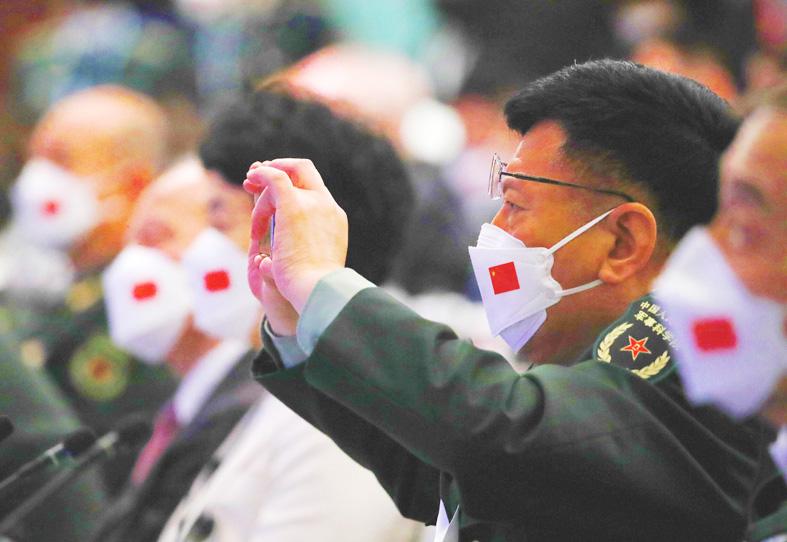The Mainland Affairs Council (MAC) yesterday denounced China for publicly threatening Taiwan at an international event, saying that it was tantamount to a declaration of war and flouted peaceful international relations.
The council made the remarks after Chinese Minister of National Defense General Wei Fenghe (魏鳳和) earlier in the day said that China would “fight to the very end” to stop Taiwanese independence.
In a fiery address to the Shangri-La Dialogue security summit in Singapore yesterday, Wei said that Beijing would have “no choice” but to fight if attempts are made to “separate” Taiwan from China.

Photo: CNA
“We will fight at all cost, and we will fight to the very end,” he told the summit, which brings together defense ministers from Asia and elsewhere.
“No one should ever underestimate the resolve and ability of the Chinese armed forces to safeguard its territorial integrity,” he said.
“Those who pursue Taiwanese independence in an attempt to split China will definitely come to no good end,” he added.

Photo: EPA-EFE
The MAC said in a statement that Wei’s remarks “proved that Beijing is the source of the regional disturbance.”
The council said it is “a fact” that the two sides of the Taiwan Strait do not belong to each other, and that Taiwan has never been a part of China.
China has been ignoring Taiwan and other countries’ opposition to its aggressive actions and false claims, and trying to unify with Taiwan by force, the MAC said, adding that China would suffer the consequences of meddling with Taiwan’s international support.
Separately yesterday, Premier Su Tseng-chang (蘇貞昌) said that Taiwan does not want to close the door on relations with China and is willing to engage in the spirit of goodwill, but on an equal basis and without political preconditions.
Speaking to reporters after China on Friday announced a ban on imports of Taiwanese grouper fish on safety grounds, a move Taipei called politically motivated, Su said Taiwan has always shown goodwill toward China.
“As long as there is equality, reciprocity and no political preconditions, we are willing to engage in goodwill with China,” he said, reiterating a position that President Tsai Ing-wen (蔡英文) has repeatedly made in public.
“As for China’s harassment of Taiwan with military aircraft, warships, unreasonable suppression and political actions, the one being most unreasonable is China,” Su added. “Taiwan does not want to close the door to China. It is China that has used various means to oppress and treat Taiwan unreasonably.”
Beijing has refused to speak to Tsai since she was elected in 2016, viewing her as a separatist who has refused to accept that China and Taiwan are part of “one China.”
Tsai says only Taiwan’s people can decide their future, and while they want peace with China, they would defend themselves if attacked.
Minister of Foreign Affairs Joseph Wu (吳釗燮) yesterday wrote on Twitter: “#Beijing banned #Taiwan #FreedomPineapple imports, now it’s targeting our groupers. That’s what the communists do: They buy & pirate tech before weaponizing. Free & fair trade with #China is a fail. We’re just putting more ammunition in their stockpile.”

CHAOS: Iranians took to the streets playing celebratory music after reports of Khamenei’s death on Saturday, while mourners also gathered in Tehran yesterday Iranian Supreme Leader Ayatollah Ali Khamenei was killed in a major attack on Iran launched by Israel and the US, throwing the future of the Islamic republic into doubt and raising the risk of regional instability. Iranian state television and the state-run IRNA news agency announced the 86-year-old’s death early yesterday. US President Donald Trump said it gave Iranians their “greatest chance” to “take back” their country. The announcements came after a joint US and Israeli aerial bombardment that targeted Iranian military and governmental sites. Trump said the “heavy and pinpoint bombing” would continue through the week or as long

TRUST: The KMT said it respected the US’ timing and considerations, and hoped it would continue to honor its commitments to helping Taiwan bolster its defenses and deterrence US President Donald Trump is delaying a multibillion-dollar arms sale to Taiwan to ensure his visit to Beijing is successful, a New York Times report said. The weapons sales package has stalled in the US Department of State, the report said, citing US officials it did not identify. The White House has told agencies not to push forward ahead of Trump’s meeting with Chinese President Xi Jinping (習近平), it said. The two last month held a phone call to discuss trade and geopolitical flashpoints ahead of the summit. Xi raised the Taiwan issue and urged the US to handle arms sales to

BIG SPENDERS: Foreign investors bought the most Taiwan equities since 2005, signaling confidence that an AI boom would continue to benefit chipmakers Taiwan Semiconductor Manufacturing Co’s (TSMC, 台積電) market capitalization swelled to US$2 trillion for the first time following a 4.25 percent rally in its American depositary receipts (ADR) overnight, putting the world’s biggest contract chipmaker sixth on the list of the world’s biggest companies by market capitalization, just behind Amazon.com Inc. The site CompaniesMarketcap.com ranked TSMC ahead of Saudi Aramco and Meta Platforms Inc. The Taiwanese company’s ADRs on Tuesday surged to US$385.75 on the New York Stock Exchange, as strong demand for artificial intelligence (AI) applications led to chip supply constraints and boost revenue growth to record-breaking levels. Each TSMC ADR represents

Pro-democracy media tycoon Jimmy Lai’s (黎智英) fraud conviction and prison sentence were yesterday overturned by a Hong Kong court, in a surprise legal decision that comes soon after Lai was jailed for 20 years on a separate national security charge. Judges Jeremy Poon (潘兆初), Anthea Pang (彭寶琴) and Derek Pang (彭偉昌) said in the judgement that they allowed the appeal from Lai, and another defendant in the case, to proceed, as a lower court judge had “erred.” “The Court of Appeal gave them leave to appeal against their conviction, allowed their appeals, quashed the convictions and set aside the sentences,” the judges